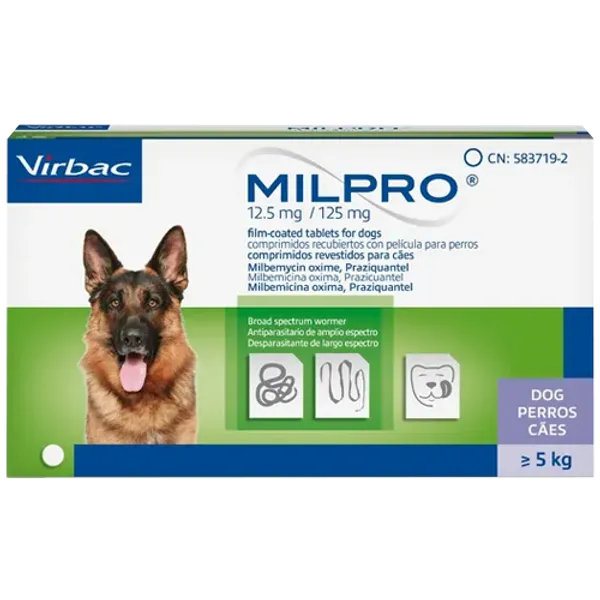Important Warnings and Precautions
Please read the entire package leaflet before use. Milpro for Dogs 1 Tablet 12.5mg/125mg is a veterinary medicinal product subject to prescription, and specific precautions apply.
Contraindications
- Do not use in dogs weighing less than 5 kg.
- Do not use in cases of hypersensitivity to the active substances (Milbemycin oxime, Praziquantel) or any of the excipients.
Special Warnings and Precautions for Animals
- Worm Control Programme: An effective worm control programme should consider local epidemiological information and your dog's living conditions. Professional veterinary advice is recommended.
- Parasite Resistance: Frequent, repeated use of anthelmintics can lead to resistance.
- Household Treatment: It is recommended to treat all animals in the same household concomitantly.
- Concurrent Infections: If Dipylidium caninum (a type of tapeworm) infection is present, consider treating intermediate hosts like fleas and lice to prevent re-infection.
- Collie and Related Breeds: The margin of safety for milbemycin oxime may be less in certain dogs of Collie or related breeds. Strictly observe the recommended dose for these breeds. The tolerance in young puppies of these breeds has not been investigated.
- Circulating Microfilariae: Treatment of dogs with a high number of circulating microfilariae (heartworm) can sometimes lead to hypersensitivity reactions (e.g., pale mucous membranes, vomiting, trembling, laboured breathing, excessive salivation). Use in such dogs is not recommended.
- Heartworm Risk Areas: In heartworm risk areas, or if your dog has travelled to/from such regions, a veterinary consultation is advised to exclude the presence of concurrent heartworm (Dirofilaria immitis) infestation before administering Milpro for Dogs 1 Tablet 12.5mg/125mg. If positive, adulticidal therapy is indicated first.
- Debilitated Animals: Not recommended for severely debilitated dogs or those with seriously compromised kidney or liver function, unless a benefit-risk assessment by a veterinarian indicates otherwise.
- Young Puppies: Tapeworm infection is unusual in dogs less than 4 weeks old, so treatment with combination products may not be necessary.
- Accidental Ingestion: The tablets are flavoured. Store out of reach of animals to prevent accidental ingestion.
Use During Pregnancy and Lactation
Studies have shown this combination of active substances to be well tolerated in breeding bitches, including during pregnancy and lactation. However, as specific studies with Milpro for Dogs 1 Tablet 12.5mg/125mg have not been performed, use during pregnancy and lactation should only be based on a benefit-risk assessment by the responsible veterinarian.
Interaction with Other Medicinal Products
Concurrent use with selamectin is well tolerated. Caution should be taken with concurrent use of other macrocyclic lactones as further studies have not been performed.
Adverse Events (Side Effects)
Very rare (affecting less than 1 in 10,000 animals treated, including isolated reports) adverse events include:
- Hypersensitivity reactions
- Systemic disorders (e.g., lethargy and anorexia)
- Neurological disorders (e.g., muscle tremors, ataxia (incoordination), and convulsions)
- Digestive tract disorders (e.g., emesis (vomiting), diarrhoea, and drooling)
Report any adverse events to your veterinarian or directly via the national reporting system (e.g., www.gov.uk/report-veterinary-medicine-problem/animal-reacts-medicine).
Special Precautions for the Person Administering the Product
- Wash hands thoroughly after use.
- In case of accidental ingestion, especially by a child, seek medical advice immediately and show the package leaflet or label to the physician.
- Do not handle this veterinary medicinal product if you have a known hypersensitivity to the active substances or excipients.
- Echinococcosis Hazard: Echinococcosis (a severe tapeworm infection) poses a hazard to humans and is a notifiable disease. Obtain specific guidelines on treatment, follow-up, and safeguarding persons from the relevant competent authority.
Special Precautions for Disposal
- Medicines should not be disposed of via wastewater or household waste as this veterinary medicinal product may be dangerous for fish and other aquatic organisms.
- Use take-back schemes or consult your veterinary surgeon or pharmacist on how to dispose of unused or expired medicines in accordance with local requirements to protect the environment.

